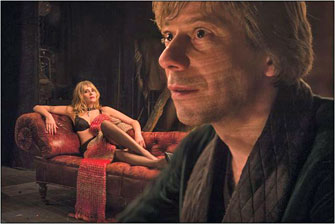
Roman Polanski’s latest film (in French), La Vénus à la Fourrure (Venus in Fur), takes place in a huis clos, as did his last feature, Carnage. Both are based on plays, the former by David Ives (who shares the writing credit with Polanski) and the latter by Yasmina Reza. This fascination with theater seems to suit the director, but Vénus unites the two genres far more successfully than Carnage did.
The movie stars Emmanuelle Seigner (Polanski’s wife), in a brilliant turn, and Mathieu Amalric, whose performance is far superior to that in his last film, Jimmy P. (Psychotherapy of a Plains Indian). While he occasionally indulges his tendency to overact, in general he is excellent in Vénus.
The story revolves around the 19th-century novella Venus in Furs by Austrian writer Leopold von Sacher-Masoch (whose name gave birth to the term “sado-masochism”), about a man, Severin von Kusiemski, who wants nothing from the woman he loves, Wanda von Dunajew, but to be treated cruelly by her, as her slave. Amalric plays the theater director and playwright Thomas, who has adapted the novel for the stage.
I won’t go into much detail about the plot, with its many twists and turns, which should be left to the spectator to discover. The story begins with Thomas alone in a darkened theater telling the person on the other end of his cellphone that the auditions he has been holding for an actress to play Wanda have been a disaster and that he will be home soon. In bursts the rain-drenched Vanda, volubly explaining and apologizing for being late and begging him to give her a chance to audition. He refuses, but she is irrepressible. He gives in only when she begins to cry. His irritation with this rather vulgar woman, however, turns to fascination when she falls into the role of a 19th-century Austrian lady as if she were to the manner born, while he reads the part of Severin.
From there, their interaction takes off on a psychological rollercoaster ride that pits man against woman, sexist against feminist, sadist against masochist, intellectual against populist, director against actress, with the power shifting from one to the other as their roles become increasingly confused.
The most wonderful thing about Vénus is the way it occasionally casts the magic spell that theater at its best is capable of (but so rarely accomplishes), drawing the viewer almost physically into another world. In each case, it is Seigner’s acting that works the magic.
Polanski cleverly enhances the effect by providing sound effects for the stage directions. For example, we hear the slight rattling of a porcelain cup against its saucer when Amalric sets down an imaginary coffee cup, but it is so subtly done that at first you are not sure that you really heard it. Even without such cinematic tricks, however, he makes stage magic work: we have no problem believing, for instance, that a long woolen scarf is Venus’s fur.
While it deals with complex issues, Vénus is also full of humor and highly entertaining throughout. Don’t miss it.
Favorite